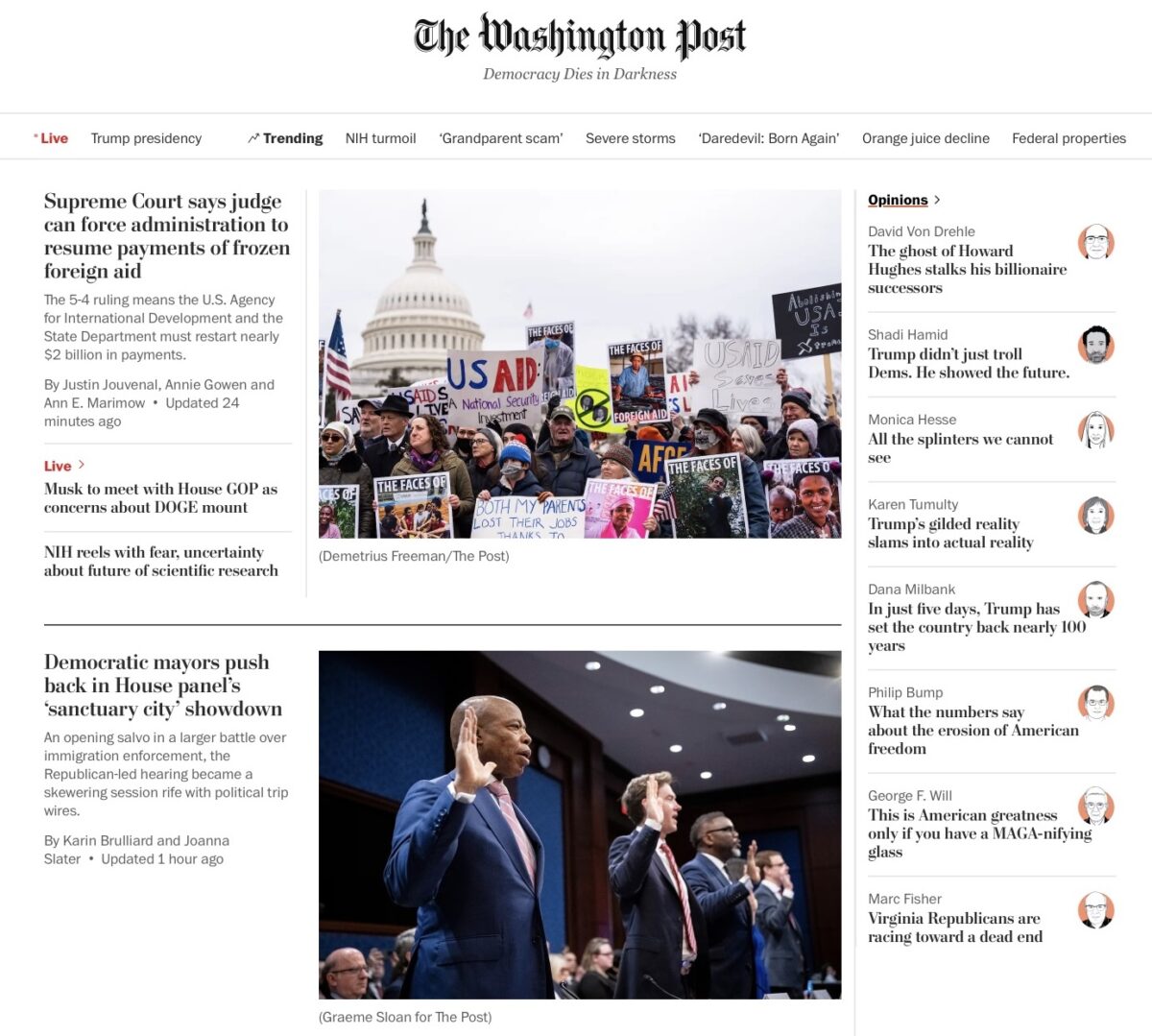Despite Bezos’ Efforts to Shove WaPo Opinion to the Right, Op-Eds Still Taking Defiantly Anti-Trump, Anti-Musk Tone

AP Photo/Lauren Victoria Burke
Washington Post owner Jeff Bezos has made a number of widely-reported moves to push the paper in a more conservative direction, but so far the Opinion Section is still taking an overwhelmingly critical approach regarding President Donald Trump, Elon Musk, and other Republicans.
The Post has generated a slew of headlines for the recent turmoil within its ranks as staffers have bristled at efforts by Bezos and Post publisher and CEO Will Lewis to adopt a more right-leaning, MAGA-friendly tone, including directing the paper to forgo an endorsement of Vice President Kamala Harris and a February 26 staff-wide email from Bezos announcing a “new direction” for the Opinion Section to be clearly “in support and defense of two pillars: personal liberties and free markets,” a move that spurred Opinion Editor David Shipley to resign and several of the Post’s top journalists to issue sharp, public rebukes — even threatening to join Shipley in tendering their resignations.
Meanwhile, Trump and Musk’s efforts with DOGE to rapidly reshape the federal government have been highly controversial, from an email demanding all federal workers justify their continued employment to the massive layoffs being pushed to Musk’s conflicts of interest.
Multiple lawsuits have already been filed challenging the creation of DOGE, their activities, their access to sensitive government data and files, and Musk’s role, plus the DOGE-led effort to cut off vast swaths of foreign aid funding.
On Wednesday, one week after Bezos’ email purported to establish the Opinion Section’s “new direction,” a review of the Post’s offerings showed numerous examples of columns with sharp critiques of Trump and Musk. Below is a screenshot from the Post’s homepage, with the highlighted opinion columns along the right:

Screenshot via The Washington Post on March 5, 2025.
A review of these op-eds shows all of them contain critical takes on Trump, Musk, and Republicans in power at the state and federal level.
“The ghost of Howard Hughes stalks his billionaire successors” by David Von Drehle compares Musk to the “deeply weird” Howard Hughes, “an awkward, obsessive, engineering-minded man who found himself super rich at a very young age and used his money to indulge one wild passion after another,” a “rocket man” whose “contracts and his money brought him into intimate contact with government at the highest levels.” Von Drehle offers a stark warning for Musk, an admitted user of ketamine and other drugs:
But while his wealth, celebrity and power were ascending, Hughes was descending into mental illness and addiction. Injuries suffered in a catastrophic plane crash left him dependent on painkillers and sedatives. He had obsessive compulsive disorder. (For a long period of his life, Hughes ate peas at every dinner but only after sorting them by size on his plate.) His lifelong fear of germs made him a recluse, hiding in dark hotel suites watching the same movies over and over, stark naked and alone.
When he died at 70, Hughes was a picture of misery, his lanky frame emaciated by malnutrition, his hair long and stringy, his untrimmed nails like yellow claws. X-rays revealed numerous broken hypodermic needles lodged in his track-marked flesh.
“Trump didn’t just troll Dems. He showed the future.” by Shadi Hamid assesses Trump’s speech to a joint session of Congress Tuesday evening as “a performance as radical as it was unusual” with “little in the way of legislative priorities or practical governance” and “no talk of unity.” Trump’s speech, Hamid argued, was little more than “elaborate (and not-so-elaborate) attempts to troll Democrats,” and showed that American politics for the “foreseeable future” were reduced to “a series of stunts and provocations masquerading as leadership.” With the GOP majority Congress forfeiting its place as a coequal branch of government, Hamid wrote, “it has been refashioned as an enabler of Trump’s whims, resentments and obsessions” — essentially creating an “elected monarchy,” which is “fundamentally at odds with the American constitutional system, which was designed precisely to prevent the concentration of power in a single individual.”
“All the splinters we cannot see” by Monica Hesse is a direct rebuke to Bezos’ attempted “new direction,” with the author describing the painful removal of a splinter from her foot as a metaphor for how “we all know how to march on, even when our feet hurt.” Hesse then writes at length about her views of “personal liberties” that likely would not find much agreement among Trump or congressional Republicans. She expressed her desire to do her best to “stand firmly” on her beliefs because “democracy needs to be preserved, and lawmakers need to be held to account, and Elon Musk ‘accidentally canceled’ Ebola prevention, and someone just died of measles, which the United States had declared eliminated 25 years ago…and all of us are doing the best we can under the confusing circumstances of life.”
“Trump’s gilded reality slams into actual reality” by Karen Tumulty is another critique of Trump’s speech, describing the president as “the master showman as always, creating an illusion at odds with an anxious reality” who was “less than halfway through his first 100 days and what he has achieved thus far is mostly turmoil and a blizzard of legal challenges,” along with a stock market dive sparked by his new tariffs on Canada, Mexico, and China, an “act of economic and political arson” that will hit working-class Americans the hardest.
“In just five days, Trump has set the country back nearly 100 years” by Dana Milbank also took swings at Trump’s speech, writing that the president came to Congress “[a]rmed with a portfolio of fabricated statistics.” When one looks past the bravado and taunts, wrote Milbank, what’s revealed in these early days of Trump’s second term is a “blizzard” of “constitutionally alarming” executive orders, “wanton sabotage of federal agencies and the federal workforce” by Musk, and a history-making ” smashing of the security and trade arrangements that have kept us safe and free for generations.”
“What the numbers say about the erosion of American freedom” by Philip Bump takes an even more direct and detailed swipe at Bezos’ “new direction” than his colleague Hesse did. Bump, who was among the Post reporters who publicly tweeted critiques of the Bezos email, questioned Bezos’ assertion that the pillars of freedom were being eroded. Contrary to Bezos’ framing of the problem as being one of economic liberties being infringed, Bump digs into a series of studies to assert that “America and its economic peers enjoy more economic and personal freedom than the rest of the world,” and it was the foundations of democracy itself and freedom of speech and the press that were under assault, with multiple assessments showing a pattern that the “measurements of freedom and democracy in the United States eroded as Trump first took power.”
“This is American greatness only if you have a MAGA-nifying glass” by George F. Will takes on the fallout from the disastrous Oval Office meeting between Trump, Vice President JD Vance, and Ukrainian President Volodymyr Zelensky, specifically calling out Secretary of State Marco Rubio as one of the “midgets of MAGA” and a “small occupant of an office once held by big people” who should rightfully be embarrassed by his obsequious praise for Trump’s “turning U.S. foreign policy 180 degrees, away from supporting democracies toward rewarding war criminals.” Vance is denounced as “a bull who carries a china shop around with him” and Musk as someone who “confuses hyperactivity with achievement” and “is, like Trump, incapable of imagining how his incessant spouting off is making him smaller.”
“Virginia Republicans are racing toward a dead end” by Marc Fisher laments the Trumpian evolution of the Virginia GOP, having run off both “thoughtful moderates” and “movement conservatives with a populist touch” to become “a virtually undifferentiated Party of Trump,” offering primary voters a “menu of mind-numbing sameness,” battling only over “who can show the most fealty to Trump” — even though Democrats have won the state during presidential elections since 2008.
Clicking directly to the Opinion Section page finds only the paltriest offerings for a Trump-supporting Republican.
After scrolling past the Post Editorial Board’s column on “How tariffs will make America poorer,” one does find a March 3 guest column by Sen. Mitch McConnell (R-KY) urging Congress to pass a full-year defense appropriations bill rather than sticking with a continuing resolution set at FY2024 levels, a March 2 op-ed from Marc Thiessen declaring Zelensky must “mend the breach with Trump — or resign,” and a column from National Review senior political correspondent Jim Geraghty that provides what appears to be the Opinion Section’s sole — albeit limited — praise for Trump’s joint session speech, criticizing the president over his Putin-friendly foreign policy, trade wars that were crashing the stock markets, DOGE’s messes, and other problems but highlighting how Trump’s remarks did emphasize “one subject that genuinely merits a high-fiving victory lap: Illegal immigration has slowed to a trickle.”
A long-running and common criticism among conservatives about the media is that many outlets rarely offer right-leaning viewpoints, except in limited doses from a handful of token contributors, who were commonly referred to with descriptions like “the [newspaper name]’s conservative writer.” The emergence of Trump as force with the Republican party has narrowed the GOP-friendly slots even further, with a number of long-running conservative commentators becoming some of MAGA’s loudest critics.
Jennifer Rubin held the “conservative writer” title at the Post when she joined in 2010, then wrote anti-Trump columns for years, and departed to join The Contrarian in January. David French was a senior writer for National Review and now writes a column for The New York Times that regularly shreds Trump, populism, and the Trump era changes to the Christian right. Jonah Goldberg was previously with Fox News and National Review and now is a contributor at CNN and writes a regular column for the Los Angeles Times. Trump-supporting Republicans would not likely view any of these writers as on their side; on social media it often seems that the MAGA-aligned invective is thrown more harshly at these apostate Never Trump Republicans than at the left.
The current makeup of the Post’s Opinion Section does not appear to have evolved past the established framework, with most columns critical of the Republican president, his “Senior Advisor” Musk, and the Republicans supporting them — and only a few voices exiled to their designated corner in opposition. Whether or not that is the correct strategy for the nearly 150-year-old newspaper is yet to be determined, but thus far Bezos’ “new direction” looks an awful lot like the old.
New: The Mediaite One-Sheet "Newsletter of Newsletters"
Your daily summary and analysis of what the many, many media newsletters are saying and reporting. Subscribe now!






Comments
↓ Scroll down for comments ↓